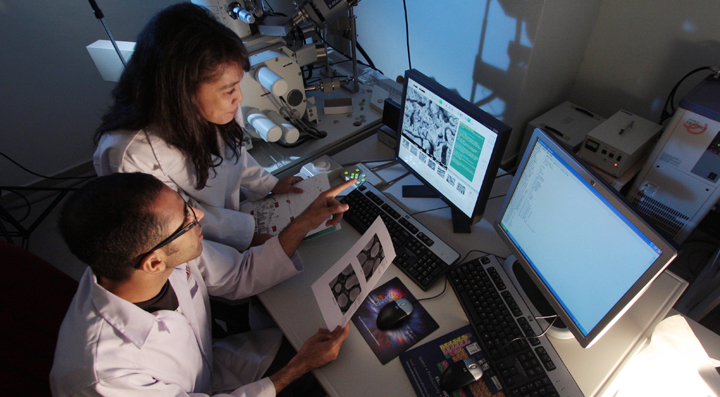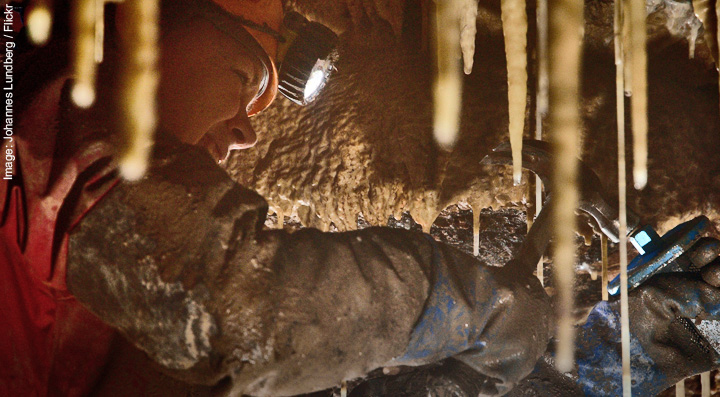PhD or DPhil
The successful submission of a substantial project called a ‘thesis’ or ‘dissertation’.
- This is normally limited to 100,000 words and often means 200 to 300 pages of written work in total.
Passing an interview with specially appointed external examiners termed a ‘viva’ or a ‘defence’.
- PhDs in the United Kingdom are assessed on a pass/fail basis
- At the viva stage, corrections are often recommended, if required, by the external examiners.
 Student Profile
Student Profile

Sedimentology PhD Student
 Finding a PhD
Finding a PhD
You will need a good first degree (generally a 2:1 result or higher) and often a masters-level qualification (integrated masters or a postgraduate MSc/MRes) to qualify for a PhD course.
PhD courses are typically based around a specific research question (or ‘thesis’) which is developed by a supervisory team (typically 2 or 3 per project). However, some candidates can approach PhDs in other ways such as creating their own thesis (and agreeing this with a supervisory team), or turning their masters-level dissertation into a PhD.
Most University departments offer PhD projects and typically advertise lists of projects annually, normally between October and December (usually for a January application deadline). Applicants may start a PhD at several points in the academic year, most typically late September/early October, although in geology projects this is often dictated by the need to schedule fieldwork.

 Why do a PhD?
Why do a PhD?
Students undertake PhD projects for a variety of reasons. However, the underlying motivation is usually a high level of interest in the subject matter and a desire to discover more about it.
PhDs are not just about the student writing a dissertation. A major aspect is to train students to be effective research scientists. This means that, in addition to their research, PhD students undertake a lot of additional training beyond the scope of their thesis in things like research techniques/equipment, academic writing and specialist software. Some of this training also occurs overseas especially if one or more of the supervisory team is based at a foreign university/institution.
Additionally, PhDs can be very useful for getting into certain career pathways. For example:
- Universities and academia: The overwhelming majority of university lecturers in Earth science departments have completed PhDs and continued with 'post-doctoral studies'.
- Research positions: PhDs are all about research. The majority of research positions, whether in universities, governmental bodies or commercial organisations, will require applicants to have a PhD.
- Governmental roles: the government always needs knowledgeable advisers and consultants. Many will have completed PhD studies and this will have aided their credibility as governmental advisors.
- Senior roles in geological industries: Some senior roles in geological organisations will require a PhD in a relevant topic. Having a PhD may also help in getting more senior roles earlier on during a geologist's career.

 Funding your PhD
Funding your PhD
Research councils, such as NERC (Natural Environment Research Council), provide funding for PhD courses through a series of Doctoral Training Partnerships (DTP) or Centres for Doctoral Training (CDT). Research councils use public money to fund original research and NERC are the most common research council funding source for PhDs in Earth science. Doctoral Training Partnerships involve a broad grouping of recognised departments from different universities, whereas Centres for Doctoral Training are based around a particular theme (e.g. oil and gas, palaeontology, solid earth). Project lists and certain training schemes are commonly shared across a DTP or CDT.
Many University departments also partially or fully fund PhD projects themselves, irrespective of whether or not the particular department is involved in a DTP or CDT. These will typically be advertised and listed on the departmental website of the host university.Other schemes for funding PhDs are also available through the British Geological Survey's BUFI (BGS University Funding Initiative).
Some more 'applied' projects may also have partial or full funding from a company. These can be linked in with DTPs or CDTs but often they are stand-alone projects. Additionally, they frequently have rather unusual start-dates.
 What financial support could I receive?
What financial support could I receive?
The term 'funding' is not entirely clear to many. 'Fully funded' (full-time) PhD students typically receive the following financial support:
- Annual university tuition fees are paid for (students are always charged tuition fees, even at PhD level)
- An annual tax-free 'stipend' - this is essentially what the PhD student is paid to undertake the research. The actual amount varies depending on the geographical location of the university but is usually between £14,000 and £20,000 per year.
- A 'research grant' - this is an extra part of the funding which goes on things like resources (e.g. computer hardware) or laboratory time/fieldwork the PhD student requires to undertake their research. This varies depending on the individual thesis but is often around £10,000 in total for the duration of the project.
 Supplementing your funding
Supplementing your funding
Many PhD students also supplement their funding by undertaking part-time work as a 'graduate teaching assistant' or 'demonstrator'. They help lecturers teach undergraduate classes, particularly with exercises set in the lectures.
 Research Grants
Research Grants
The Geological Society also offers some small (usually around £1,000) supplementary bursaries for original geological research. Please visit the research grants page for more information. Research grants are also offered by other specialist research groups.




